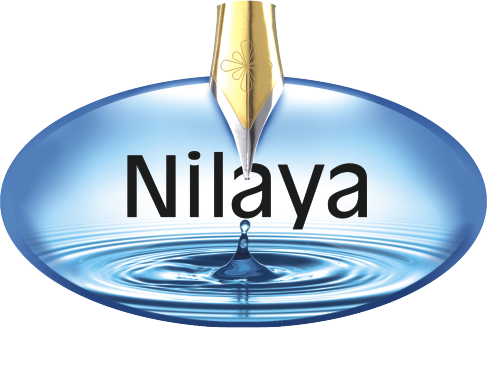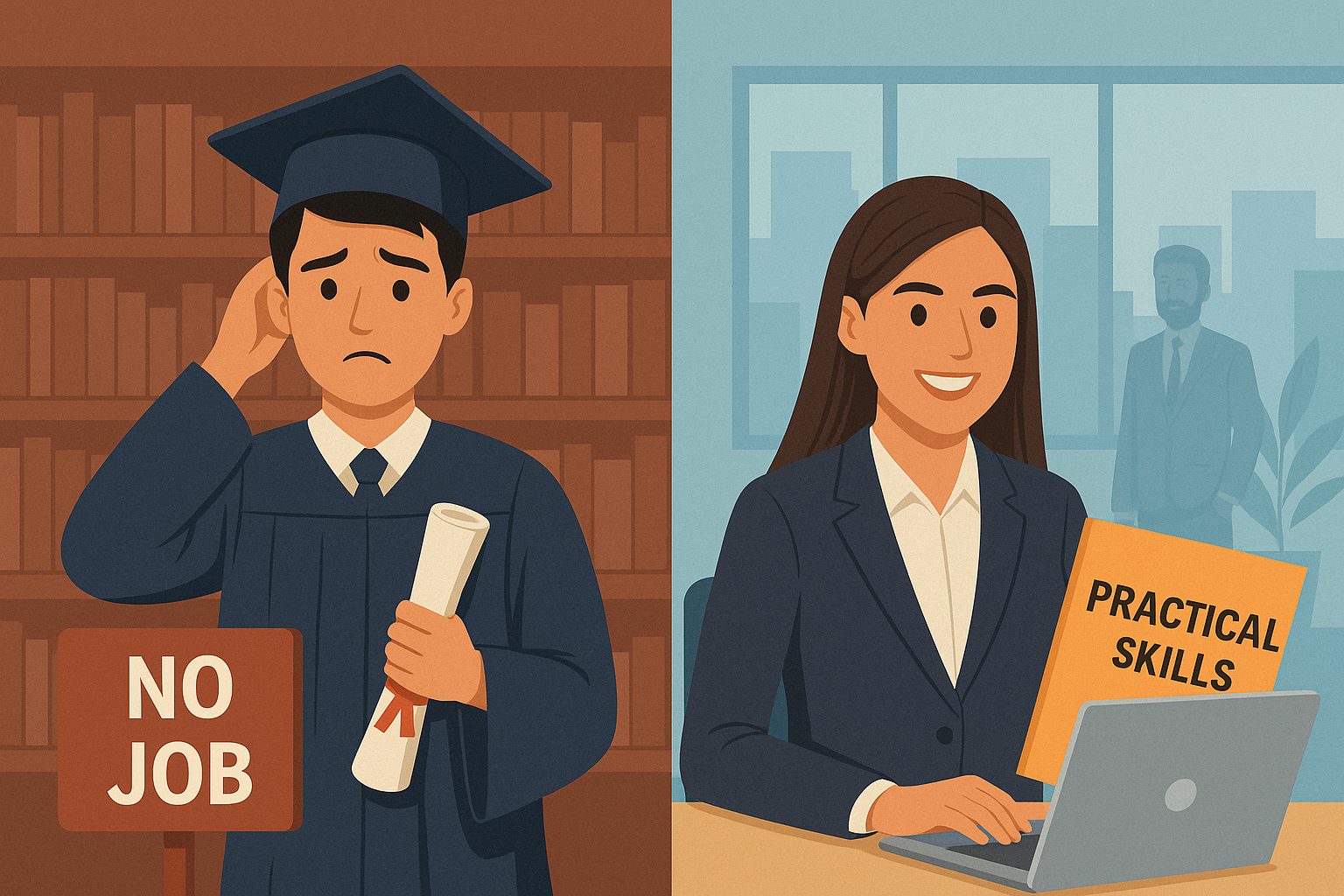Why Practical Education Matters More Than Just a Degree Today
A few decades ago, holding a degree was considered the golden ticket to a successful career. It was a signal of knowledge, discipline, and employability. But today, in 2025, the landscape has changed dramatically.
Hiring managers aren’t just asking “What degree do you have?”—they’re asking:
- What tools do you know?
- Are you comfortable working with AI and automation?
- What problems can you solve?
- Have you ever worked on a real project?
- How do you present yourself professionally?
In today’s evolving job market, practical education focused on actionable skills, industry-relevant tools, and real-world application is becoming more critical than ever. It bridges the gap between academic theory and workplace readiness.
This shift is especially true in commerce, business, and management streams, where thousands of graduates enter the market every year… but only a fraction are truly job-ready.
Let’s explore why practical education matters more than just a degree today—and how you can make sure you’re choosing the right path for your future.
The Degree Dilemma: Why practical education alone is not enough?
There’s nothing wrong with pursuing a degree. In fact, academic knowledge builds critical thinking, discipline, and foundational concepts. But in isolation, a degree doesn’t always translate into employability.
Here’s why:
- Most college syllabi are outdated or overly theoretical
- Students rarely get exposure to tools like Tally, Excel, GST, Power BI, SAP, CRM, or Google Ads
- Soft skills like email writing, business etiquette, resume building, and communication are rarely taught
- There’s often no structured internship or live project component
The result? Students graduate with degrees… but lack the ability to perform in a real job setting. They struggle in interviews, lack confidence in the workplace, and often end up in roles unrelated to their studies.
The New Hiring Mindset: Skills + Intelligence to Excel in a Professional Career
Today’s recruiters are not only looking at academic records but assessing a student’s overall intelligence, adaptability, and execution ability. In a fast-paced business world driven by automation and AI tools, those who combine practical skills with strategic thinking are standing out. The modern workplace rewards applied knowledge and smart decision-making—often more than degrees alone.
Companies today care about outcomes, not just education. They want candidates who can:
- Create Excel reports in a jiffy
- File GST returns
- Design a marketing campaign with hands-on data
- Lead a sales pitch presentation
- Communicate clearly and confidently in meetings
- Contribute to the team from day one
“Degrees can open the door—but skills keep it open.”
That’s why students with hands-on experience, tool proficiency, and workplace readiness are hired faster and paid better, even if they don’t come from big-name universities.
Lets Breakdown Practical Education Really Means
Before we dive into the specific elements, let’s understand what practical education really stands for. It’s not just about using software—it’s about building job-ready intelligence, business sense, and professional behavior. Especially in the age of AI-driven decision-making, students need to learn how to use both tools and judgment effectively.
So what does practical education include? Here are the core pillars:
1. Tool Training
Learning real-world tools like:
- Tally + GST + Income Tax return filing
- Microsoft Excel (advanced formulas, dashboards)
- SAP FICO + Power BI + MIS reporting
- CRM systems like Salesforce or Zoho
- Digital platforms like Google Ads, Meta Ads, LinkedIn
2. Live Projects
Working on assignments that mimic actual business challenges. Examples:
- Preparing balance sheets
- Managing vendor ledgers
- Creating marketing reports
- Handling client accounts in internship simulations
3. Soft Skills Development
- Public speaking, email etiquette, interview practice
- Grooming, body language, professional conduct
- Time management, workplace discipline
4. Mentorship & Feedback
- Regular review of performance
- Real deadlines, corporate simulations, manager-style mentoring
5. Career & Placement Support
- Resume building with real achievements
- Internship placements with real deliverables
- Job readiness programs and mock HR rounds
When all of these are combined within your academic journey, you don’t just graduate—you transform.
What Happens When Students Learn Practically
Let’s consider two hypothetical B.Com students:
Rohit: completes a standard B.Com with 75% marks.
Aarav: (an AI-ready learner) completes a practical-focused B.Com where they:
- Learn Tally, GST, Excel, and Power BI
- Gain exposure to tools integrated with AI analytics and reporting
- Do a 3-month internship with live reporting tasks
- Build a digital resume with certifications
- Practice interviews and group discussions regularly
Which student is more employable?
In most cases, Aarav gets the job faster, performs better from day one, and earns quicker promotions.
This isn’t just a theory—it’s the reality many companies and recruiters now acknowledge.
How Institutes Like Nilaya Bridge the Gap
The gap between education and employability is growing—but some institutes are solving it. Nilaya Education focuses on building real-world competence, not just academic completion. Their curriculum has been developed to ensure that students thrive in AI-era workplaces, where human thinking is combined with tech tools and systems.
At Nilaya Education, practical education isn’t an add-on. It’s built into the foundation of every course—whether it’s Smart B.Com, Smart BBA, CAM, CAFM, or Smart MBA.
Here’s what that means in action:
- Students use industry software daily.
- Resume labs, grooming sessions, and mock interviews are part of the curriculum.
- Internships are mandatory, not optional.
- A stamp-paper backed job guarantee is available for high-performing students.
- Soft skills and personality development run alongside technical learning.
As a result, Nilaya students are often seen transitioning from classroom to boardroom without losing confidence—because they’ve already experienced the corporate environment during their learning journey.
How to Choose Practical Over Theoretical
If you’re a student or parent evaluating education options, ask these questions:
- Does this course include tool training with certification?
- Will I get to work on live projects or internships?
- Is there mentorship and real-time feedback?
- Are there sessions on soft skills, grooming, and communication?
- Do past students get placed in relevant industries?
If the answer is yes to most of these—you’re on the right track.
Final Thoughts
A degree is still important—but in today’s economy, it’s only the starting point. What takes you forward is what you can do, how well you can do it, and how confidently you show up in the workplace.
Practical education doesn’t just make you job-ready—it makes you life-ready.If you’re a student who wants more than just a certificate—someone who wants to actually perform in the real world—then it’s time to look beyond marksheets and start investing in real learning that delivers real outcomes.

